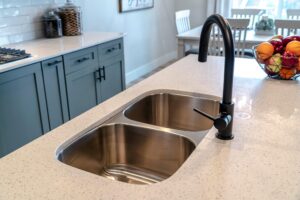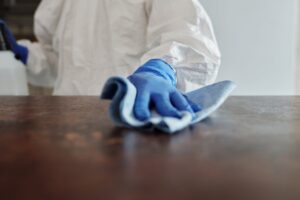Quartz countertops are constructed of 90 percent powdered quartz and 8 to 10 percent resins, polymers, and colors. They have engineered stone countertops. Due to its durability and simplicity of cleaning, quartz is a popular option for worktops in kitchens and bathrooms. Many designers and homeowners also favor the adaptability of its color and style. Given that it is artificial stone, every kitchen style may use it because of the wide variety of colors and designs available.
The light shades of quartz countertops are the most common, though. Any design and color scheme will work with light-colored quartz countertops.
Do Quartz Countertops Stain
Although quartz countertops are very stain resistant, it is untrue that they are stain-proof. Quartz is susceptible to stains from red wine, coffee, tea, tomato sauce, juice, and other substances, just like any other countertop form, if the spills are not cleaned up quickly. Contrary to granite, a natural stone, the countertop surface absorbs the staining liquid, preventing staining from happening.
One of the primary components of quartz countertops, resin, interacts with the liquid, which causes discoloration. Quartz countertops are partly non-porous due to polishes, but they can also be harmed by chemicals, heat, and cleaning agents.
The two main components of quartz countertops are polymer resins and natural quartz. Natural quartz is the only material resistant to liquids, impervious to gases, and non-reactive.
The polymer resins, which comprise 5% and 10% of the total volume, hold the quartz particles together. However, under some circumstances, polymers may experience minor chemical changes. For instance, if you apply a solid chemical to the quartz countertop and leave it there for an extended period, this might happen.
Slow responses might leave stains. The countertops are safe for food preparation despite what it may seem like since producers utilize stable polymers with excellent chemical resistance. Because quartz is hard and non-porous, it is unlikely to discolor.
QUARTZ COUNTERTOP STAINS AND HOW TO PREVENT THEM
It might be unsettling to find stains on your elegant quartz countertop. Quartz countertops are fortunately very stain resistant, albeit not entirely stain-proof. Culinary ingredients like turmeric or food colors on quartz countertops may leave a mild to very faint stain. Quartz countertops can, fortunately, have stains removed.
The good news is that you may readily avoid stains on quartz countertop surfaces. Wipe up spills immediately and utilize protective covers like cutting boards, coasters, trays, and trivets.
White or light-colored quartz countertops are also susceptible to stains from incorrect cleaning. Avoid using bleach-containing cleaners on your countertop, and keep paint thinners and other solvents away from the quartz surface.
How to clean quartz countertops of stains
No matter how carefully you maintain your counters, stains occasionally remain.
Most experts advise using a powder cleaning like Bar Keeper’s Friend or Bon Ami because most stains on quartz are caused by liquid that was allowed to linger on the surface for too long. You can utilize a nylon pad or brush, sprinkle the powder over the stain, and scrub. Apply glass cleaner on top of minor surface spots and scrub away with a nylon scrub pad made of non-abrasive material. These techniques will clean quartz of stains but won’t repair a broken resin.
 CONCLUSION
CONCLUSION
One can stain white quartz countertops, but the whole process can be easily prevented by taking preventative measures. Learning what to do when they stain is also essential in keeping them clean and pristine.
If you want help picking out and installing countertops for your home, call Granite Dude at (602) 513-6886, and we’ll be happy to assist you. Granite Dude is an installer of natural stone countertops for kitchens and bathrooms.








